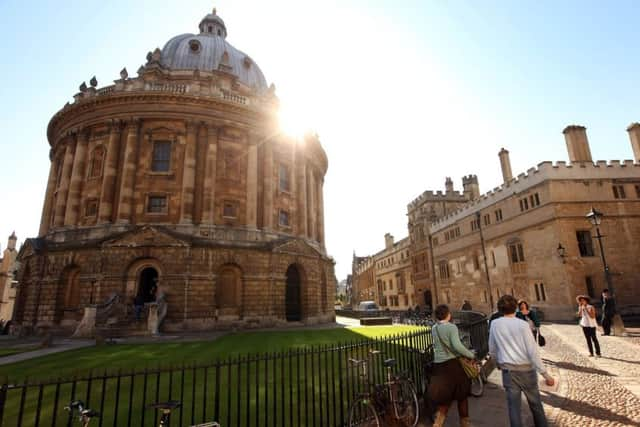Meet the 21-year-old from Yorkshire giving hundreds of state school students the secrets of how to get into Oxbridge


When Joe Seddon made his way down from Yorkshire to Oxford for his interview to attend the oldest and perhaps most-respected university in the English-speaking world, he says it was almost like arriving on a different planet.
“I had never been to Oxford before and the ambience of the place is very inspiring but also daunting. It felt like a very alien environment,” he recalls. “You walk into this room with three very grand Oxford dons and if you are not properly prepared, you can’t really put your best foot forward. If you have gone to private school, you will have got the confidence to deal with that situation instilled in you from a very young age and you know how to give a good account of yourself.”
Advertisement
Hide AdAdvertisement
Hide AdSeddon, who grew up in a single-parent family in Morley, on the outskirts of Leeds, says he would not describe himself as underprivileged and attended Heckmondwike Grammar School, which the late MP Jo Cox, her successor Tracy Brabin and former Yorkshire cricketer Andrew Gale also all went to. But he says like many of his peers back home, attending Oxbridge seemed an unlikely prospect. Indeed, last year of the seven people from the Morley and Outwood constituency to apply for an Oxford place last year, all were rejected.


“One very inspiring teacher at the school motivated me to apply, it wasn’t really on my radar,” he says. “The interview was a very tough, difficult experience and it made me realise how difficult it is for people who go to state school to negotiate the process.”
Interviews for Oxbridge infamously often involve responding to abstract questions and intellectual arguments in a way many teenagers have not experienced. The application process also involves writing a personal statement and taking an admissions exam comparable to IQ tests.
Despite feeling he “froze” at his interview, he was offered a place to study Philosophy, Politics & Economics at Mansfield College, which takes the vast majority of its pupils from state schools. “I really enjoyed myself at Oxford,” Seddon says. “The work is very difficult but it does instil a great deal of resilience into you. There are people from lots of different backgrounds but the thing I realised was I could compete with them when we were on a level playing field.”
Advertisement
Hide AdAdvertisement
Hide AdWhile he appreciated the privilege of attending Oxford, which has been named as the best university in the world for three years in a row, Seddon’s time there gave him an even greater insight into precisely why the odds are stacked against people from non fee-paying schools, with wealthy families able to game the admissions system.
To help support himself, Seddon started online tutoring where prospective Oxbridge students, often from abroad, paid for lessons in how best to prepare for the application process. It planted the seed of the idea for what Seddon, who is now 21, established after graduating last July – a free online mentoring service for talented pupils from disadvantaged areas of the country that he has called Access Oxbridge.
“The nub of the idea came from my personal experience. Many Oxford and Cambridge students do private tutoring on the side as there is a big demand for those services. A little bit of tutoring can be incredibly effective. I just thought, people from all backgrounds should have access to those resources.”
The statistics bear out Seddon’s concerns about the need to break down barriers at Oxbridge. A recent study by The Sutton Trust social mobility charity found that between 2015 and 2017, Oxbridge recruited more
students from eight top schools – six
Advertisement
Hide AdAdvertisement
Hide Adof which were private institutions such as Eton College – than almost 3,000 other English state schools put together. A total of 42 per cent of Oxbridge places go to private school pupils, despite them accounting for just seven per cent of all students in the country.
After graduating and turning down a job in the City, Seddon headed back home to Yorkshire where he used his self-taught coding skills to create an online platform to match suitable mentors already attending Oxbridge with prospective students. He set the criteria for those using the service as people who attend a state school, have a strong academic record or come from an area with low university take-up or be from a low socio-economic background - using the same criteria to define ‘disadvantaged’ as Oxbridge.
Seddon launched the platform last autumn and got an immediate response – with his idea winning the backing of female education activist and Nobel Prize laureate Malala Yousafzai, who is now studying at Oxford after surviving an assassination attempt by the Taliban in 2012.
“I started it up in September and it went viral straight away. We got 100 mentors overnight. I was very happy it took off so quickly, I wasn’t expecting it at all.”
Advertisement
Hide AdAdvertisement
Hide AdThe platform works by matching teenagers hoping to attend with existing students over video chat platforms Skype and FaceTime for one hour per week to provide them with an insight into things like how to write a personal statement and what to expect in the interview process. Seddon says he now has more than 600 mentors signed up from Oxford and Cambridge, while 50 state school pupils who have used the platform have now been offered places to study at Oxford and Cambridge.
“It is all about making the resources available to the private sector also available to the state sector. It is a very simple idea but it is already having a powerful effect.”
Seddon says the success rate of the state school pupils who have used his system is around 30 per cent – almost double the normal admissions rate. At Oxford in 2017, 19,000 people applied for the 3,200 available undergraduate places – with less than 17 per cent of applicants getting in.
With recent figures showing Oxford is spending £108,000 for each additional student from a poor background it admits every year, Seddon says he is proud that his self-financed organisation is managing to do it for free.
Advertisement
Hide AdAdvertisement
Hide AdAccess Oxbridge is currently a non-profit social enterprise that is applying for charitable status and Seddon says he is looking to “raise as much funding as possible” to give it – and the young people it helps – a brighter future.
Seddon says the success of his fledgling platform, which is aiming to help 500 students from disadvantaged backgrounds this year, is bittersweet because of the need for it to exist in the first place.
“It just goes to show that talented, motivated students from disadvantaged backgrounds can beat the odds when given access to information, resources and free tuition. For far too long students from disadvantaged backgrounds have been let down by a system which claims to be meritocratic but in reality lets far too many talented students from low-income backgrounds fall through the net.
Oxbridge’s problems are just a microcosm of a broken education system which entrenches privilege whilst locking disadvantaged students out of the most prestigious institutions.
Advertisement
Hide AdAdvertisement
Hide Ad“For a lot of students, Oxbridge just isn’t on their radar whatsoever or they have perceptions about what it is like. The way we solve the problem is by getting students from disadvantaged backgrounds in and showing they can succeed and be happy there.”
Abigail offered Oxford place after using scheme
Abigail Fox is one of the state school pupils to be offered a place at Oxbridge having used Joe’s platform.
The comprehensive pupil from Birmingham will be the first person from her family to go to university having been offered a place to study English Literature at Balliol College, Oxford.
She did three months of weekly video tutorials with tutor Sophie Conquest through the Access Oxbridge scheme. “This process has not only given me so much information and advice on applying to Oxford but also the confidence to feel like I could actually succeed. Without the invaluable help of my mentor Sophie I would never have believed that I could belong to such a place as Oxford. What once seemed a pipe dream turned into a realistic goal.”